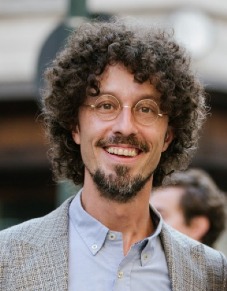Paolo Pescarmona appointed as full professor

The Engineering and Technology institute Groningen is proud to announce that Prof Paolo P. Pescarmona has been granted promotion by the Executive Board of our University to full professor. We congratulate him with his appointment.
Paolo P. Pescarmona
Paolo was born in Italy and studied at the University of his hometown (Torino), where he obtained his Master Degree in Chemistry in 1997. In 1999 he moved to the Netherlands, where he obtained his PhD from Delft University of Technology in 2003. Then, he worked for various years at the KU Leuven, in Belgium, first as post-doc and then as assistant professor. In 2014 he moved to the University of Groningen, where he is currently Associate Professor in Sustainable Chemical Products and Catalysis. His research approach involves the rational design and development of catalytic materials for applications of academic and industrial relevance, with a special focus on green chemistry. His group is active in all aspects of the development of catalysts: from the synthesis to the characterisation and testing, with an expertise ranging from heterogeneous to homogeneous catalysis and encompassing electrocatalysis and photocatalysis. The targeted applications are in the context of sustainability and include CO2 conversion, H2O electrolysis for green H2 production, biomass conversion, selective (electro)catalytic oxidations and reductions, and the exploration of reactions in supercritical CO2.
Paolo is currently the Director of the Master programme in Chemical Engineering at the University of Groningen. Since 2016 he is the President of the Dutch Zeolite Association.
| Last modified: | 11 April 2022 8.19 p.m. |
More news
-
24 March 2025
UG 28th in World's Most International Universities 2025 rankings
The University of Groningen has been ranked 28th in the World's Most International Universities 2025 by Times Higher Education. With this, the UG leaves behind institutions such as MIT and Harvard. The 28th place marks an increase of five places: in...
-
05 March 2025
Women in Science
The UG celebrates International Women’s Day with a special photo series: Women in Science.
-
16 December 2024
Jouke de Vries: ‘The University will have to be flexible’
2024 was a festive year for the University of Groningen. In this podcast, Jouke de Vries, the chair of the Executive Board, looks back.
